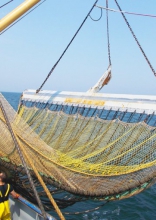The policy informing brief 'Pulse fishing in the Southern North Sea' (Dutch) provides an overview of the legal developments concerning European pulse fishing over the past 30 years. Both the historical context and the current regulations, which will make the ban on pulse fishing effective from 1 July 2021, are explained in more detail. The report outlines the situation in the various North Sea countries and clarifies the creation of the former Dutch pulse fleet. An important observation from European legislation, or the so-called 'technical measures', is that the widely communicated ban does not apply to scientific research under certain conditions.
The current findings of the study on pulse fishing in the North Sea show that fuel consumption, seabed disturbance and - in many cases - by-catch are lower for pulse fishing than for traditional beam trawling. The direct effects of an electrical pulse on marine organisms depend on species and differ between the shrimp and sole pulses. Researchers did not observe any clear adverse effects in adult (in)vertebrates exposed to the shrimp pulse. In the case of the tongue pulse, only a limited number of cod fish observed fractures in the spine and/or adjoining muscle bleeding. Other vertebrates and benthic invertebrates showed no marked negative effects of the tongue pulse.
However, there are still many uncertainties regarding the ecological impact of pulse systems. Most of the studies on the effects of pulse fishing took place in laboratory conditions and cannot be easily translated into natural conditions. In addition, possible long-term effects on the development, reproduction, growth and behavior of marine organisms were not investigated. In order to be able to assess the effectiveness, impact and reliability of the pulse cores, the technique needs to be further evaluated by means of scientific research.
Link:
www.vliz.be/nl/catalogus?module=ref&refid=319652
Image (c) ILVO
